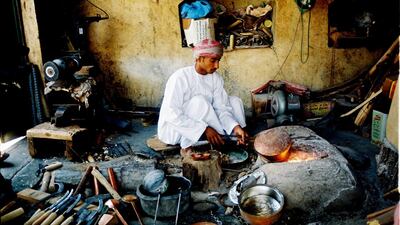Jamal Hassan was close to tears when he walked out of the bank with approval papers for a 25,000 rial (Dh249,200) state loan, knowing he could now start his own business and would no longer have to stand in the unemployment line.
The 26-year-old is among 735 young Omanis who since March have been approved for loans under a government self-employment financing plan aimed at reducing the number of growing jobseekers in the country.
Mr Hassan plans to invest his loan in a tour guide company in his hometown of Jaalan Abu Ali in eastern Oman.
"I was close to tears when the Oman Development Bank (ODB) approved my loan. I did not believe my luck," he told The National.
"Finally, I am going to control my own financial destiny. I will not let ODB down and I am determined to make it a success."
________________
Read more:
25,000 jobs to be created for Omanis from the end of the year
Oman students face bleak future with crippling academic loans
________________
According to the ministry of manpower, nearly 60,000 Omanis are currently looking for jobs, mostly graduates.
More than 1,500 projects worth 14 million rials were financed by the state-run ODB as part of the government's self-employment financing plan. Under the scheme, the ODB offers so-called "soft loans" with either very low or zero interest rates depending on the amount borrowed. Loans above 5,000 rials have a 2 per cent annual interest rate and a one-year repayment grace period, while loans of 5,000 rials or below have no interest rate (although there is no repayment grace period).
In October, Oman pledged to create 25,000 jobs from December in an effort to reduce unemployment as the country faces its worst job crisis in 40 years.
It came after the government in March allocated a budget of 11 billion rials to help generate thousands of jobs over the next five years. Part of this fund was allocated for the self-employment financing plan to help Omanis set up small to medium enterprise (SME) projects.
Khalifa Al Mabsali, 27, used his 25,000 rial state loan to launch a traditional cooking pots business in his hometown of Sohar, in northern Oman.
“I am reviving the old tradition of cooking vessels made of alloy of metals like copper, silver, steel and tin," said Mr Al Mabsali. "There is a big demand for it since new cooking pots do not last long. It is six months since I started this business and I have already sold more than a thousand items to different towns of Oman."
It is not just young men who are taking advantage of the soft loans offered by the scheme. Many young Omani women are also following the trade financing trail to achieve their dreams of independence.
One of them is Maya Al Kindi, 26, who in July launched an interior decorating business in Muscat after having a 20,000 rial loan approved a month earlier by the ODB.
Ms Al Kindi was not intimidated by competition from big companies who are dominating the interior decorating industry. She told The National she had "an ace up my sleeve" to stay ahead of her well-established competitors.
“My designs reflect Omani customs for the conservatives. For those who like the best of both worlds, I combine local traditions and the western flavour," she said. "In this regard, I am unique and I believe I am the only one in the country who is catering for this type of interior decoration. I don’t worry about my competition because I am different from the rest of the pack."
Such young people could help to relieve the employment headache currently facing Oman.
There are no available statistics on how many Omanis are employed by self-employed entrepreneurs like Mr Hassan, Mr Al Mabsali and Ms Al Kindi, but between them, the three employ 14 Omani school graduates in various different positions, from drivers and administrators to sales people.
But, financing experts warn, although there are benefits of financing schemes like the one currently offered by the ODB, there are also considerable risks if recipients of the loans are not given the proper training to launch their own businesses.
“All these young people are not experienced when it comes to establishing and managing businesses," said Mahmood Al Essai, a retired SME executive for Bank Muscat.
"Though the ODB is doing a commendable effort to make them own their own trades, a condition should be imposed that all of them must be trained. For example, they need to understand how to have a sustainable business plan, understand budgeting and know how to market their businesses. This training will make sure that they stay afloat and make profits in the long run.”
The government has been giving out loans to help Omanis set up their own businesses — under various schemes — for the past two decades. There are no statistics available, however, to show how many businesses have been launched in total off the back of such loans, or how many have failed.
Qais Al Shehi, who took out an ODB loan eight years ago to set up his business, Al Shehi Property Management, in Muscat, believes the success stories of business ventures financed by state loans outweigh the failures.
“Yes, it is good to train them (entrepreneurs who take out such loans) about business management but I am one of the examples who made a success out of it without training after I received an ODB loan," he said.

